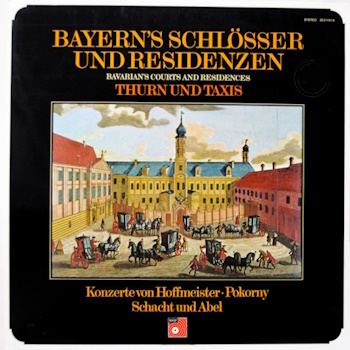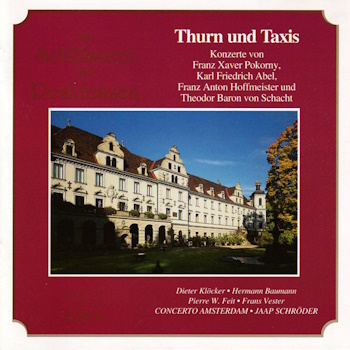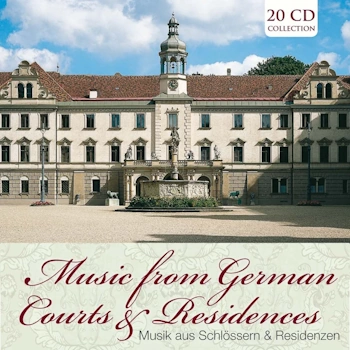 |
|
2 LPs
- 29 21191-6 - (p) 1972
|
 |
| 2 CDs -
44 2173-2 - (c) 1993 |
|
THURN
UND TAXIS
|
|
|
|
|
|
|
|
| Franz Xaver
POKORNY (1729-1794) |
Concerto
F-Dur für 2 Hörner, Stzreicher und
2 Flöten |
LP 1 |
|
13' 50" |
|
|
-
Allegro |
|
5' 58" |
|
A1 |
|
-
Larghetto poco andante |
|
5' 20" |
|
A2 |
|
-
Finale: Presto assai
|
|
2' 29" |
|
A3 |
|
(Hermann Baumann,
Christoph Kohler: Horn)
|
|
|
|
|
| Franz Xaver POKORNY |
Konzert
D-Dur für Flöte und Orchester |
LP 1 |
|
14' 45" |
|
|
-
Allegro molto
|
|
6' 51" |
|
A4 |
|
-
Adagio
|
|
4' 02" |
|
A5 |
|
-
Rondo |
|
3' 49" |
|
A6 |
|
(Frans Vester:
Flöte)
|
|
|
|
|
| Karl Friedrich ABEL
(1723-1787) |
Konzert
B-Dur für Violine, Oboe,
Klarinette und Orchester |
LP 1 |
|
17' 56" |
|
|
-
Allegro - (Kadenz: Jaasp Schröder)
|
|
7' 41" |
|
B1 |
|
-
Adagio - (Kadenz:
Karl Friedrich Abel) |
|
4' 24" |
|
B2 |
|
-
Allegro ma non troppo - (Kadenz:
Jaasp Schröder) |
|
5' 44" |
|
B3 |
|
(Jaap Schröder:
Violine | Pierre W. Feit: Oboe |
Dieter Klöcker: Klarinette) |
|
|
|
|
| Franz Anton HOFFMEISTER
(1754-1812) |
Konzert
B-Dur für Klarinette und Orchester |
LP 2 |
|
20' 12" |
|
|
-
Allegro
|
|
6' 06" |
|
C1 |
|
-
Adagio
|
|
6' 22" |
|
C2 |
|
-
Rondo: Allegro
|
|
4' 43" |
|
C3 |
|
(Dieter Klöcker:
Klarinette) |
|
|
|
|
| Theodor Baron von
SCHACHT (1748-1823) |
Konzert
D-Dur für Klarinette und Orchester |
LP 2 |
|
20' 20" |
|
|
-
Allegro · Tempo giusto
|
|
11' 23" |
|
D1 |
|
-
Adagio
|
|
5' 00" |
|
D2 |
|
-
Allegretto con variazioni |
|
7' 53" |
|
D3 |
|
(Dieter Klöcker:
Klarinette) |
|
|
|
|
|
|
|
|
CONCERTO AMSTERDAM
|
| Jaap SCHRÖDER,
Leitung |
|
|
|
|
Recorded
at: |
|
-
|
|
|
Live / Studio
|
|
Studio |
|
|
Producer |
|
-
|
|
|
Balance engineer
|
|
-
|
|
|
First LP Edition
|
|
BASF
| 29 21191-6 | 2 LPs | durata
46' 31" - 40' 32" | (p)
1972
|
|
|
First CD Edition |
|
PILZ
- ACANTA | 44 2173-2 | 2 CDs |
durata 46' 31" - 40' 32" | (c)
1993 | ADD
|
|
|
Note |
|
-
|
|
|
|
|
Musik
aus Schlössernb &
Residenzen
(20 CD Collection)

Membran |
234355 | (c) 2016
(in CD 3
& 4)
|
The
numerous manuscripts which, in
the 18th and 19th centuries,
were in the possession of
Southern German princely
families and which are now
awaiting ressurrection in
libraries and archives are of
inestimable musical value. They
date from a culturally rich
period in which numerous princes
maintained their private operas
and orchestras and rivalled one
another in attracting the best
composers and musicians: Danzi,
Cannabich, Rosetti Reicha, Fiala
and Kalliwoda were in their time
highly estimated orchestra
leaders, who composed music in
order to entertain and to
display the dignity of those who
reigned by the Grace of God.
In Germany the name „Thurn and
Taxis“ is inseparably bound up
with the origins of a postal
service. The connection goes
right back to the end of the
15th century when members of the
family began to set up postal
links between all the larger
towns of the „Holy Roman Empire
of the German Nation“. The
family, which originally came
from Northern Italy, working
with great resourcefulness and
energy, gradually established a
permanent and reliable service.
A hereditary title was created,
and, in 1615, the family of
Thurn and Taxis was officially
appointed Postmaster General to
the Empire. In 1624 Lamoral von
Taxis was given the title of
count and in 1695 Eugen
Alexander was made a
Reichsprinz. The family
residence, during the 16th
century in Brussels and after
1702 in Frankfurt on Main, was,
in 1748, transferred to
Regensburg, the seat of the
permanent Reichstag
(Parliamentary Diet). This move
was brought about by Prince
Alexander Ferdinand’s additional
appointment as Chief
Commissioner of the Reich, a
post which necessitated his
continual presence in
Regensburg, where he had to
represent the Emperor at the
Reichstag. This office was held
by the Thurn and Taxis family
right up to the dissolution of
the Empire in 1806. The duties
involved were mainly ceremonial.
On the occasion of the Emperor’s
accession to the throne it was
the Prince to whom the city paid
homage. Soon after moving to
Regensburg Alexander Ferdinand
had assembled his own court
orchestra, and by 1755 we find
14 court musicians listed in the
„Etat de la musique“. By 1760
the princes had opened their own
French theatre. Prince Carl
Anselm, who took over the title
in 1773, was even fonder of
music and the theatre than his
father had been. His enthusiasm
and generosity enabled the
orchestra to expand and the
court theatre to be enlarged.
The Prince appointed Theodor
Freiherr von Schacht, who had
been in the service of the
family since 1771, as Director
of the Court Music and Opera.
Under the Prince’s generous
patronage von Schacht succeeded
in creating a flourishing
musical centre. First-rate
instrumentalists were acquired
for the court orchestra, many of
them from foreign countries.
Croes from the Netherlands,
Kaffka and Pokorny from Bohemia,
Touchemolin from France and two
Italian virtuoso wind players,
Agostinelli and Palestrini were
all engaged at Regensburg.
Schacht could justifiably boast
in a letter of 30.1.1796, „Since
anno 1773 I have been in charge
as director of the department
and flatter myself that I have
attained for His Highness’s
orchestra a reputation of the
first order.“ Schacht spared no
effort to provide a continual
flow of new works to delight his
music-loving Serene Highness,
works representative of very
contemporary trend. The royal
collection in Regensburg today
contains music by 378 different
composers. The repertoire was
also enriched by contributions
from a number of Thurn and Taxis
musicians. The content of the
3000 manuscripts and prints that
make up the Regensburg
collection clearly indicates
that the wind instruments
enjoyed the greatest popularity
at the Thurn and Taxis court. As
well as numerous flute and oboe
concertos there are concertos
for clarinet, basset horn,
bassoon and horn. It is from
these that we have made our
selection for this recording.
Theodor von Schacht, the
composer of the Clarinet
Concerto in B flat, was born in
Strasbourg in 1748. After his
early musical training in
Regensburg, where he studied
under Küffner and Riepel, both
court musicians, he went to
Stuttgart in 1766. There he
became a pupil of the Italian
composer Jommelli. Two years
after returning to Regensburg in
1771 he was appointed Director
of Court Music, a post he
retained until his retirement in
1805. Between 1774 and 1778 and
from 1784 until the closure of
the court theatre in 1786 he was
also Musical Director for
Italian Opera. In the summer of
1805 Schacht journeyed to Vienna
in the hope of finding some
official recognition of his
musical ability there. This
successful enterprise was
crowned by meetings with the
Archduke Rudolf, Beethoven’s
friend, and Emperor Napoleon I,
the latter commissioning six
masses from him. Schacht
returned to Germany in 1812. He
died in 1823 in Regensburg,
where 17 years earlier, in 1806,
the court orchestra had been
disbanded. There are 155 works
by Schacht in the Regensburg
collection, including 25
symphonies, 37 concertos, 21
sacred works and 5 operas.
Franz Xaver Pokorny was born in
Bohemia in 1728. In 1753 he
became a court musician at the
court of Count
Oettingen-Wallerstein and in
1754 studied composition in
Mannheim under Stamitz,
Holzbauer and Richter. In 1770
he left Oettingen at his own
request and entered the service
of Thurn and Taxis in
Regensburg, where he worked as
violinist and composer up until
his death in 1794. The
Regensburg collection has 198
works by Pokorny, most of them
scored in his own hand. In
addition to 109 symphonies there
are 66 concertos, divertimenti,
serenades and other chamber
music compositions.
Karl Friedrich Abel was born in
Cöthen in 1723. He was a skilled
player of the bass viol and was
a member of the Dresden Court
Chapel from 1748 to 1758. He
went to London in 1759 and
settled there, introducing, in
partnership with the „English
Bach“, Johann Christian, the
famous series of concertos known
as the Bach-Abel concerts. He
died in London in 1787. His
compositions show close links
with the Mannheim school and,
probably for this reason, found
particular favour at the
Regensburg court. As well as his
Concerto for Oboe, Clarinet,
Violin and Orchestra, recorded
here, there are 12 symphonies
included in the Regensburg
collection. On the original
copies of the solo parts used in
our recording we can see the
names of the Regensburg soloists
written in Schacht’s own hand:
the oboist Hanisch, the
clarinetist Schierl and the
violinist Kaffka – all members
of the Thurn and Taxis court
orchestra for many years.
Franz Anton Hoffmeister was born
at Rottenburg on Neckar in 1754.
He turned to music at an early
age and eventually became one of
Vienna’s best-known music
publishers, publishing many of
the works of his famous
contemporaries (Mozart, Haydn
and Beethoven). He died in
Vienna in 1812. Hoffmeister was
a much respected composer
himself, and, included in the
numerous publications that
Schacht obtained from him were
many works of his own. At
Regensburg there are copies of
the orchestral parts for 8
symphonies, a flute concerto and
the clarinet concerto recorded
here, as well as printed
editions of 21 string quartets.
Hugo Angerer
|
|